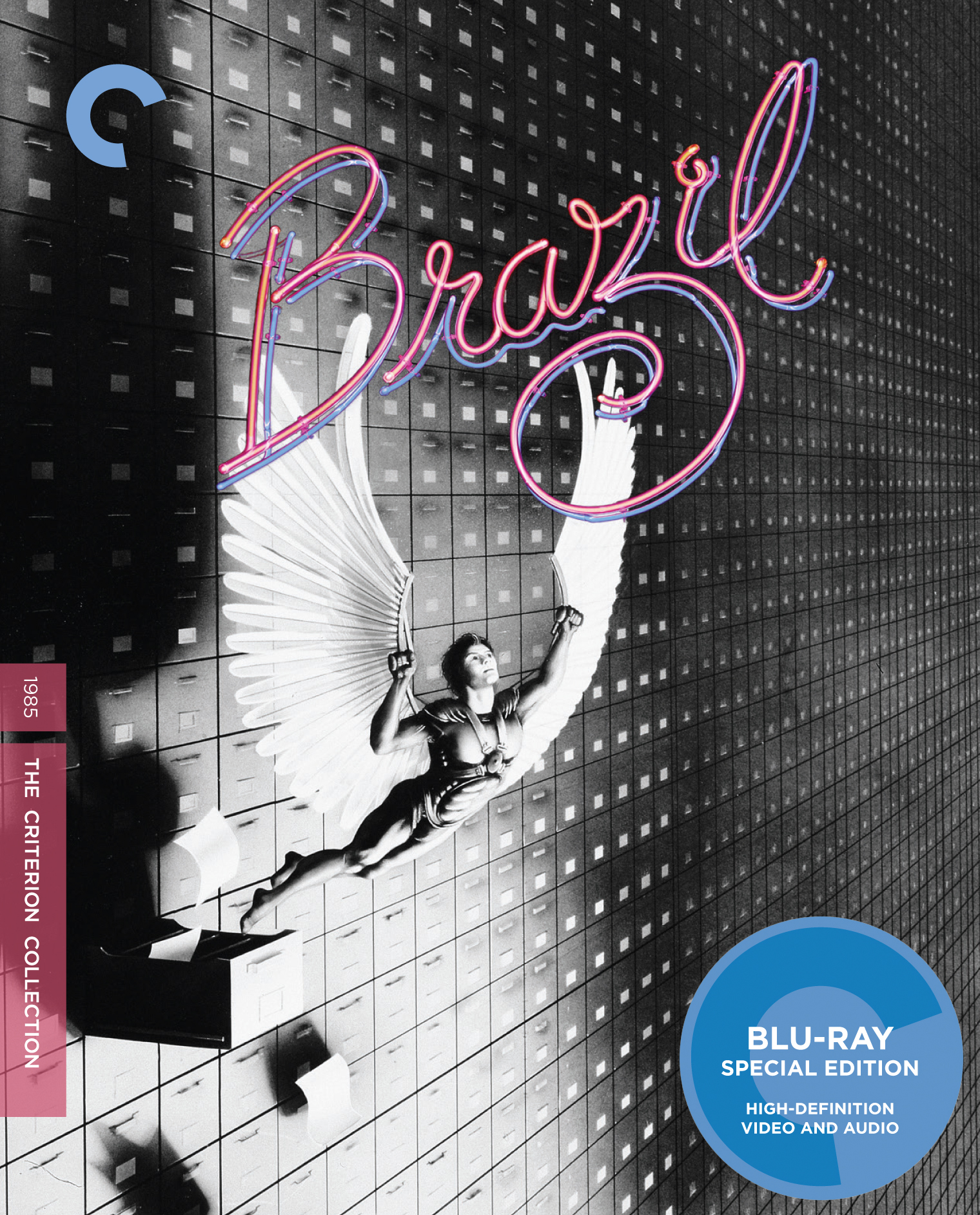
Review: Terry Gilliam’s Brazil (1985) from The Criterion Collection
Written by: Jill Blake, CC2K Film Editor

Information Transit got the wrong man. I got the right man. The wrong one was delivered to me as the right man, I accepted him on good faith as the right man. Was I wrong?
-Jack Lint
A few years back I had the good fortune of attending two separate panel discussions with Terry Gilliam here in Atlanta. The first panel focused on his directorial career and included an exclusive sneak peek of The Imaginarium of Doctor Parnassus (2009). The second panel cold-opened with 20 minutes of rare footage from the never-aired Orson Welles Show before highlighting Gilliam’s work with Monty Python. His only explanation to the confused audience was that the footage we had just seen was an example of the kind of thing that inspired Python. During the Q&A portion of the first panel, someone asked him about the elaborate and ubiquitous system of ducts in Brazil. Gilliam explained that he has always been fascinated by the contents behind something. For the film, he decided to expose the inner-workings of the world’s far from perfect technology.
Terry Gilliam’s Brazil (1985) is set in a 20th century dystopian society brought on by a horribly inept bureaucracy in a totalitarian government. The residents of this unidentified country live and die by numbered forms, arbitrary fees, and sub-standard living conditions. Public spaces are plastered with propaganda posters akin to those from WWII. The government, with its Central Services division, delivers all utilities through an endless network of poorly maintained, obtrusive ducts. And instead of fixing what must have been a purchasing error, the three inch computer screens that are populated throughout the government offices have magnifying screens installed in front of them to get the displays to the correct size.
The protagonist of Gilliam’s surreal, eerily familiar world is Sam Lowry, played by Jonathan Pryce. Sam is a low-level clerk in the Department of Records, a division of the Ministry of Information. He has no lofty career goals, much to the chagrin of his vain, socialite mother Ida (Katherine Helmond). She insists Sam use her connections to obtain a more respectable position in the Ministry, but he continually declines. He would much rather go unnoticed. A typical day for Sam consists of monotonous data entry interspersed with phenomenal daydreams. These fantasies keep him relatively sane in a world dictated by ridiculous and meaningless constraints. In this alternate reality, Sam is a winged protector, soaring through the clouds in search of a damsel in distress.
Sam’s boss, Mr. Kurtzmann (Ian Holm), discovers that a typo on a warrant intended for rogue HVAC repairman Archibald Tuttle (Robert DeNiro), has led to the wrongful arrest and “questioning” of Archibald Buttle. During his session with Information Retrieval (read Torture Department), Buttle suffers a heart attack and dies at the hands of his interrogator Jack Lint (Michael Palin). Once it is discovered that Information Transit made an error in arresting Buttle, a refund check for the interrogation (yes, citizens must pay for their torture) is issued to his widow. Mr. Kurtzmann, a weasel of a man who is particularly inept at his job, assigns Sam with the task of personally delivering the check to Mrs. Buttle. Kurtzmann is keen to avoid any guilt by association which possession of the refund check in his department may cause. During his visit to the Buttle residence, Sam sees the woman from his dreams. He tries to approach her, but she runs away before he can catch her. Jill Layton (Kim Greist), is the Buttle’s upstairs neighbor at the sketchy Shangri-La Towers. She is the only other witness to Mr. Buttle’s wrongful arrest and has taken it upon herself to report the grievance to the Ministry. Since they would prefer to keep their mistakes under wraps, the Ministry has marked Jill as a potential terrorist. Sam begrudgingly uses his mother’s connections to accept a promotion in Information Retrieval so he can gain access to Jill’s confidential file in an attempt to save her from the Ministry. 

Brazil is signature Gilliam and is at once beautifully shot, darkly funny, and completely heartbreaking. Films released on DVD/Blu-ray through The Criterion Collection are always given their due respect, and Brazil is no exception. In addition to a brand new, high-definition digital transfer and remastered Dolby 2.0 surround, the two-disc special edition contains hours of extras, including the bastardized “Love Conquers All” version. Of course all of these special extras and flawless presentation mean nothing without the excellent performances under Gilliam’s direction. Jonathan Pryce is superb as the romantic, yet atypical leading man. My personal favorite of the Monty Python troupe, Michael Palin, brings dark humor to his role as the lead interrogator Jack Lint. He is absolutely frightening due to his unwavering obedience of all Ministry protocol, even when the truth proves contradictory. The marvelous Katherine Helmond, an enigmatic Robert DeNiro, Kim Greist’s rough and tumble Jill Layton: their characters all are perfectly at home in Gilliam’s creation.
DIRECTOR-APPROVED SPECIAL FEATURES (credit: Criterion):
- Restored high-definition digital transfer of Terry Gilliam’s 142-minute director’s cut, approved by Gilliam, with DTS-HD Master Audio surround soundtrack on the Blu-ray edition
- Audio commentary by Gilliam
- What Is “Brazil”?, Rob Hedden’s on-set documentary
- The Production Notebook, a collection of interviews and video essays, featuring a trove of Brazil-iana from Gilliam’s personal collection
- The Battle of “Brazil,” a documentary about the film’s contentious release, hosted by Jack Mathews and based on his book of the same name
- “Love Conquers All” version, the studio’s 94-minute, happy-ending cut of Brazil, with commentary by Brazil expert David Morgan
- Trailer
- PLUS: An essay by Jack Matthews on the DVD edition and a booklet featuring an essay by film critic David Sterritt on the Blu-ray edition
